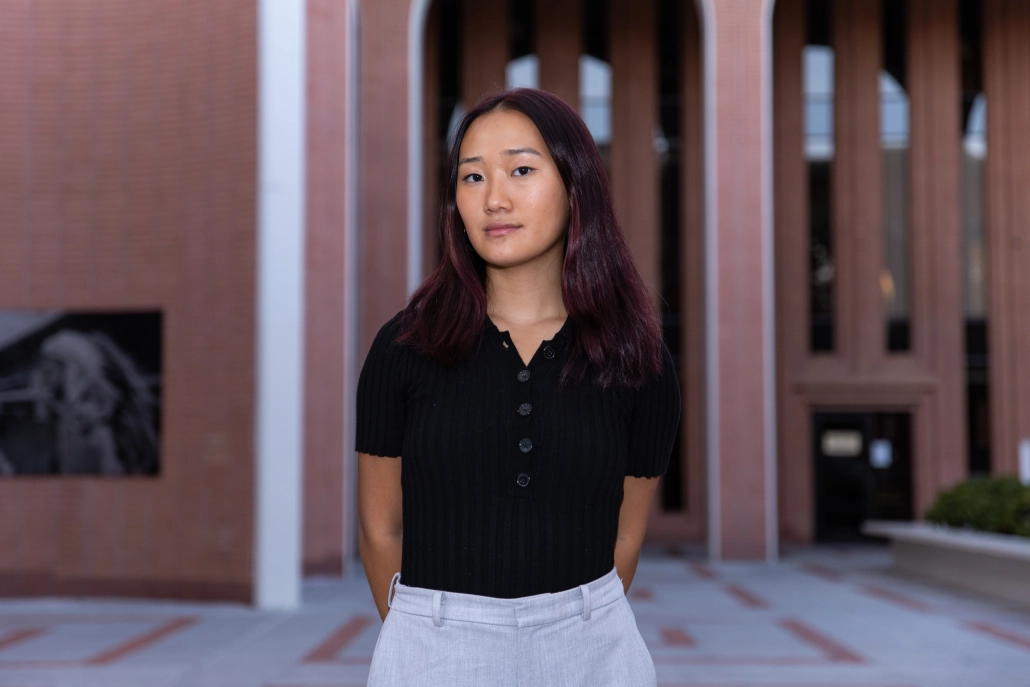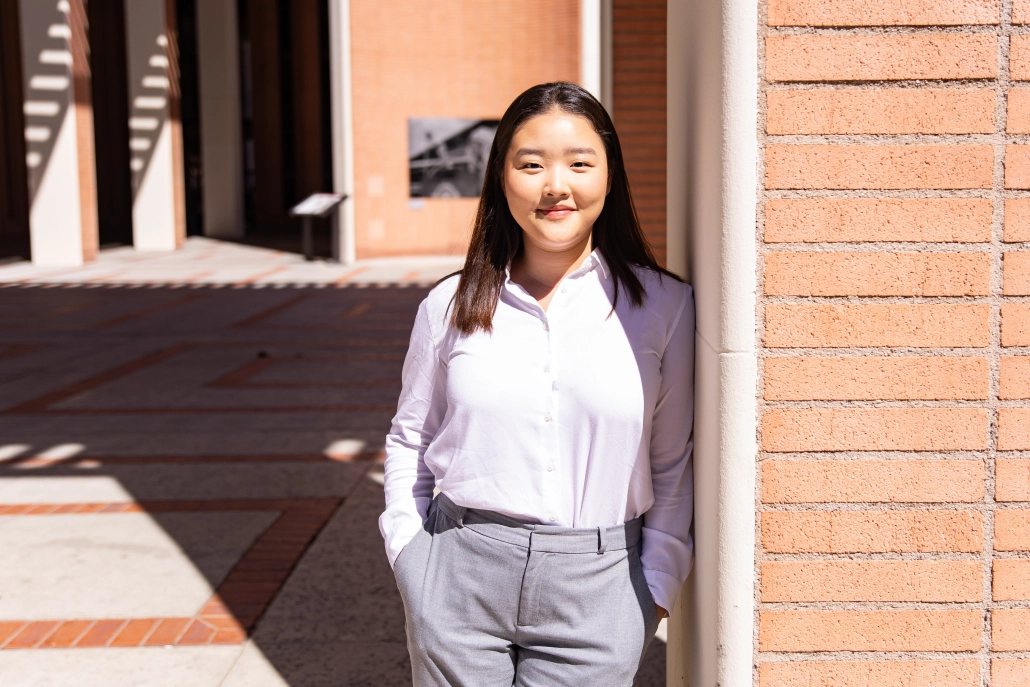USG adds inaugural historian role
Luisa Luo and Heidy Cho are the first two students to assume the position.
Luisa Luo and Heidy Cho are the first two students to assume the position.

USG has added a new position to its executive branch: historian.
Though it hasn’t been officially announced to the public, those who filled out an application to join USG for the fall semester found the role’s description on its pages.
In a statement to the Daily Trojan, USG chief of staff David Martinez shared the description of the role.
“This is a new research position in the organization intended to compile information related to the century-plus history of the Undergraduate Student Government and its predecessor organizations,” the statement read. “This role reports to the Chief of Staff. The time commitment for this position is flexible and can depend on the availability of the individual.”
Martinez was responsible for creating the role. Martinez said he had begun looking into the USG archives and past reports from campus media with now senator Rudra Saigal last year, but found the task too daunting to tackle without a dedicated role for doing so. Eventually, Martinez wants all of this historical data to be in one place for all to see.
“The ultimate goal is to craft a final project,” Martinez said. “It’s looking more like it’s going to be a web page timeline kind of thing that explains what we’ve done in the past, who’s been in our organization. Important things we’ve done, projects we’ve completed.”
Luisa Luo, one of the two USG historians, found the role when she clicked on this year’s USG application after weeks of waiting for it to go live. She said she had immense interest in joining, and that the new historian role was a perfect fit for her and her interests.
Heidy Cho, USG’s other historian, also found out about the role when looking over the application, wanting to join the student government during her sophomore year. Being a history major, she found that the role of historian fit both her intention to join USG and her personal interests perfectly. Now that she is in the role, she’s having the time of her life.
“We’re not entirely sure what the end result will be just yet,” Cho said. “But we’re thinking about something like a report, things that are updated on the USG website, maybe on their social media, but right now we’re sort of in the bulk of the research; and I’ve had a good time so far.”
Luo has always had an interest in archival research, which started when she moved to the United States at age 14. She developed an interest in U.S. history but found that the state education system in Florida, where she lived, lacked vital information due to censorship policies. To cope, Luo reached out to local libraries and handled the research herself.
“That allowed me to have access to primary sources,” she said. “It also just taught me the standards of how historians handle materials. So I think that just inspired me in terms of critical thinking and reflecting on what it means to be a modern consumer of these records and contextualizing it in today’s lens of how we consider racial relationships, et cetera.”
In terms of the actual duties of the two historians, Luo said the description has evolved since Martinez’s initial proposal. Now, the role is also dedicated to aiding USG’s efficiency by creating a space where members can see if a policy they would like to propose has already been discussed.
“The whole point about having a historian is continuity,” she said. “It’s to have the projects become extended, so that the great initiatives don’t get easily forgotten because we’ve changed the core leadership the next year due to a new round of elections, because that has happened many times.”

Cho hopes that the new role will help promote transparency towards the student body, who she realized, from browsing through social media and coverage by campus news outlets, may not know a lot about USG or what it has done, citing reports of low voter turnout.
“We’re meant to represent what the student body wants and if they are not telling us what they want or not interested in the work that we’re doing, we’re not as effective as we could be,” Cho said. “And I think that the role of history and just looking at what works, what doesn’t work, we can try to improve engagement in that regard.”
Unlike other positions within USG’s executive branch, the historians will not receive pay in the form of a stipend for their work. According to Martinez, this is an unfortunate formality. USG bylaws dictate that a new position cannot be paid until it has gone through a trial run and then approval by the executive, legislative and judicial branches. Martinez hopes that the historian will eventually receive pay.
While Cho thinks that making the historian a stipend position would be an added benefit, she is content for now as a volunteer. The work she is doing is entertaining enough.
“I knew going into it would be an unpaid position,” she said. “And I’m really doing it out of the interest that I have in history and just, I’m a bit of a nerd. I love looking at all the special collections.”
Luo said she hopes the position makes it through the trial run as she finds herself spending nearly six hours combing through just one box of archival data out of the many that sit in Doheny Memorial Library’s special collections library.
The historian position has yet to be publicized by USG, which Cho says she is fine with for now as the work has just begun, but she does hope that the position will eventually take on a social media presence in order to increase student engagement, perhaps by sharing fun facts or “This Day in History” posts.
Lara Botha, a freshman majoring in acting, said a future website or database could also be used to recognize and right some wrongs of the past, such as discrimination within USC.
“It might be a good way to catch some institutionalized racism in the past,” she said. “Like going back over policies that were aimed at a specific demographic and making sure that those are no longer implemented in any way.”
Botha also said, however, that if the archival data lacks important context, USG runs the risk of potentially repeating harmful policies. She hopes that the historian and the larger governmental body are careful in their examinations, as it could go either way.
“We might not know exactly why they stopped using those policies,” she said, “so maybe we run the risk of falling into the same hole again … I think the database will just give us a data point to look at, but how we actually use that might have two consequences; either we could repeat the things or we could use that information to go into a new direction.”
We are the only independent newspaper here at USC, run at every level by students. That means we aren’t tied down by any other interests but those of readers like you: the students, faculty, staff and South Central residents that together make up the USC community.
Independence is a double-edged sword: We have a unique lens into the University’s actions and policies, and can hold powerful figures accountable when others cannot. But that also means our budget is severely limited. We’re already spread thin as we compensate the writers, photographers, artists, designers and editors whose incredible work you see in our daily paper; as we work to revamp and expand our digital presence, we now have additional staff making podcasts, videos, webpages, our first ever magazine and social media content, who are at risk of being unable to receive the compensation they deserve.
We are therefore indebted to readers like you, who, by supporting us, help keep our paper daily (we are the only remaining college paper on the West Coast that prints every single weekday), independent, free and widely accessible.
Please consider supporting us. Even $1 goes a long way in supporting our work; if you are able, you can also support us with monthly, or even annual, donations. Thank you.
This site uses cookies. By continuing to browse the site, you are agreeing to our use of cookies.
Accept settingsDo Not AcceptWe may request cookies to be set on your device. We use cookies to let us know when you visit our websites, how you interact with us, to enrich your user experience, and to customize your relationship with our website.
Click on the different category headings to find out more. You can also change some of your preferences. Note that blocking some types of cookies may impact your experience on our websites and the services we are able to offer.
These cookies are strictly necessary to provide you with services available through our website and to use some of its features.
Because these cookies are strictly necessary to deliver the website, refusing them will have impact how our site functions. You always can block or delete cookies by changing your browser settings and force blocking all cookies on this website. But this will always prompt you to accept/refuse cookies when revisiting our site.
We fully respect if you want to refuse cookies but to avoid asking you again and again kindly allow us to store a cookie for that. You are free to opt out any time or opt in for other cookies to get a better experience. If you refuse cookies we will remove all set cookies in our domain.
We provide you with a list of stored cookies on your computer in our domain so you can check what we stored. Due to security reasons we are not able to show or modify cookies from other domains. You can check these in your browser security settings.
These cookies collect information that is used either in aggregate form to help us understand how our website is being used or how effective our marketing campaigns are, or to help us customize our website and application for you in order to enhance your experience.
If you do not want that we track your visit to our site you can disable tracking in your browser here:
We also use different external services like Google Webfonts, Google Maps, and external Video providers. Since these providers may collect personal data like your IP address we allow you to block them here. Please be aware that this might heavily reduce the functionality and appearance of our site. Changes will take effect once you reload the page.
Google Webfont Settings:
Google Map Settings:
Google reCaptcha Settings:
Vimeo and Youtube video embeds:
The following cookies are also needed - You can choose if you want to allow them:
